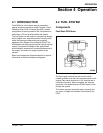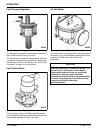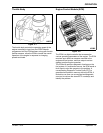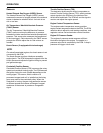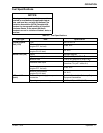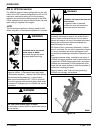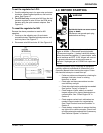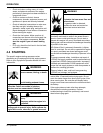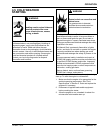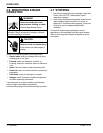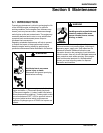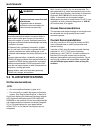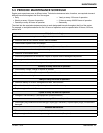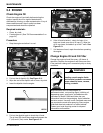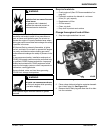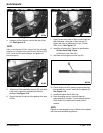
OPERATION
TP-6901 6/14 Operation 21
4.5 COLD WEATHER
STARTING
Cold weather puts added stress on the engine during
start up. To start the engine in cold weather:
1. Make sure that the engine oil is appropriate for the
ambient operating temperature. See “Fluid
Specifications” in Section 5. Drain and replace the
engine oil if necessary.
2. Disconnect all applied loads and/or equipment
before cranking the starter.
3. Allow the engine to run, unloaded, for about five
minutes after cold weather start up.
WARNING
!
Handling caustic engine fluids and
chemical products can cause
severe chemical burns, nausea,
fainting, or death.
Most chemicals such as used engine oil,
antifreeze/coolant, rust proofing agent, inhibiting oil,
degreasing agent, spray paint, and adhesives are
hazardous to health. Read and follow the user
information found on the packaging. Avoid inhalation
and skin contact. Use only in well-ventilated areas and
use a protective mask when spraying. Store engine
fluids and chemical products in a locked cabinet.
Contact your local recycling center for disposal
information and locations.
WARNING
!
Explosive fuel can cause fires and
severe burns.
If a gaseous odor is detected,
ventilate the area and contact an
authorized service technician.
LPG (Liquefied Petroleum Gas) is extremely
flammable and tends to settle in low areas where a
spark or flame could ignite the gas. Do not start or
operate this engine in a poorly ventilated area where
leaking gas could accumulate and endanger the safety
of persons in the area.
NG (Natural Gas) is extremely flammable, is lighter
than air, and rises. Do not start or operate this engine
in a poorly ventilated are where leaking gas could
accumulate and endanger the safety of persons in the
area.
To ensure personal safety, installation and repair of
LPG/NG fuel supply systems must be performed only
by qualified LPG/NG system technicians. Improperly
installed and maintained LPG/NG equipment could
cause the fuel supply system or other components to
malfunction, causing gas leaks.
Observe federal, state, and local laws governing
LPG/NG fuel, storage, and systems.



